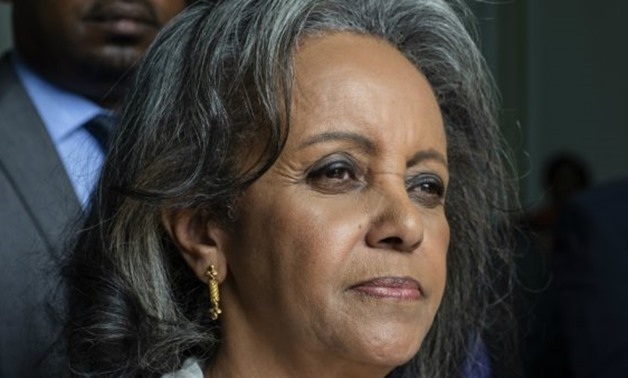
© Eduardo Soteras, AFP | Sahle-Work Zewde leaves parliament after being elected as Ethiopia's first female president in Addis Ababa on October 25, 2018.
Career diplomat Sahle-Work Zewde has been appointed Ethiopia’s first female president. On the brink of retirement, she did not seem destined for a political career.
Ethiopian parliamentarians unanimously appointed Sahle-Work Zewde as president on Thursday 25 October after the surprise resignation of Mulatu Teshome, who had held the post since 2013. This may have been a case of lucky timing. The appointment of a joint government composed of an equal number of men and women may have set the tone.
Many had presumed Sahle-Work was close to retirement after a busy career as a diplomat. But it was not broadly known that immediately before becoming president, Sahle-Work had been the UN representative for the African Union.
Africa's only current female head of state, Sahle-Work outlined her vision during her inauguration. She welcomed the reforms carried out by Ethiopian Prime Minister Abiy Ahmed since he came to power in April.
"If the changes currently being made in Ethiopia are led by both men and women, their momentum will lead to an Ethiopia free of religious, ethnic or gender discrimination," the 68-year-old said.
"Women are the first victims of the struggle for peace," she continued. "During my term, I will focus on women's role in maintaining peace, as well as the benefits of peace for women. I call on the government to eradicate poverty with women's full participation, as it is a source of instability.”
In the Ethiopian constitution, the position of president is a ceremonial role, with the prime minister holding all of the political power. "Ethiopian presidents can do nothing. It's a honorific position. But, given Sahle-Work's great experience and the trust placed in her by Abiy Ahmed, I doubt that she will remain a representative symbol," says Gérard Prunier, a researcher specialising in the Horn of Africa and a close friend of the new head of state.
Francophone and Francophile
Born in the Ethiopian capital, Addis Ababa, in 1950, Sahle-Work studied in France and is fluent in English, French and Amharic – Ethiopia's main language. She began her diplomatic career under the communist military regime in the late 1980s and she performs most of her duties in French-speaking countries. Her first appointment as a diplomat was in Senegal in 1989.
Between 1993 and 2002, she worked in Djibouti as Ethiopia's ambassador and representative for the Intergovernmental Authority on Development. "This was a time when she learned a lot about trade and Somali culture. Her position there was considered an important role for Ethiopia. After the loss of Eritrea and its only sea access in 1993, the country turned to Djibouti, where 95% of Ethiopian trade now passes through," says Prunier.
Sahle-Work then returned to Paris as Ethiopia's ambassador. "It was a very happy time for her. She loves France and the French. She is a true Francophone," says Prunier.
In 2006, Sahle-Work was recalled to Addis Ababa, where she was put in charge of the Africa Department at the Ministry of Foreign Affairs. She returned to the UN in 2011 as Director-General of the UN Office in Nairobi.
Sahle-Work didn't seem like an obvious candidate for a political position in her home country. "She wasn't wholly engaged by domestic Ethiopian politics. But she does know pretty much everyone, which was certainly an asset. And she has no enemies and could be seen as politically neutral,” says Prunier.
This will help her with her first task, which will be to manage internal political conflicts within the ruling grand coalition, the Ethiopian People's Revolutionary Democratic Front (EPRDF), composed of four ethnocentric parties.
"She is an Amhara, the ethnic group that ruled during the communist regime and was marginalised for a long time. The elite from this community would like to get back to business. The Amharas also supported Prime Minister Abiy Ahmed. She will play the role of an internal ambassador to reduce any divisions that may exist within this community,” says Prunier.
An ally for France?
However, her repeated absences from the country could also be viewed as a handicap. "She is well liked, but she is not taken very seriously,” says Prunier. “She has been abroad for a long time. She has not really forged productive and effective alliances.”
Internationally, France could benefit from this new Francophile face of Ethiopia. The European Union's second-largest economy is losing market share on the African continent and the Ethiopian economy is booming. Sahle-Work could prove to be an asset and she could use her influence with the Ethiopian Prime Minister.
"She could be a good ally for France. Ethiopia is a forward-looking country because it is at the crossroads between two very different and very complicated areas of influence, with China on one side and Saudi Arabia on the other."


Comments
Leave a Comment